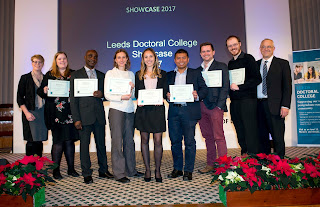Making research accessible to the non-specialist
Sharon Parkinson shares her thoughts on being part of the judging panel at the 8th Annual University of Leeds Postgraduate Research Conference, highlighting the role impact and potential impact plays in the nomination process for the Postgraduate Researcher of the Year Award.
I recently had the privilege of being on the judging panel for the 8th Annual University of Leeds Postgraduate Research Conference. Every year, each Faculty Director of Postgraduate Research Studies provides nominations for the Postgraduate Researcher of the Year Award taking into account the following criteria:
• Ability to communicate research to the non-specialist research audience in terms of, for example, application of findings for economic, social or cultural benefit; the significance of the contribution/potential contribution of the research to the academic subject area
• Impact/potential impact of the research in terms of, for example, application of findings for economic or social benefit; the significance of the contribution/potential contribution of the research to the academic subject area.
This year, there were eight nominees; and each one delivered a ten-minute presentation of their research, followed by questions from the panel. The presentations included research on: Bankers’ remuneration in the UK and China; pitting corrosion in low carbon steel; the involvement of ANO1 in pain signalling and more.
After adding up the points and deep discussion, the judges agreed on a winner - Floriane Gidel from the Faculty of Mathematics and Physical Sciences won the prize for her research on ‘Variational water-wave models and pyramidal freak waves; with implications for global shipping’. Floriane’s ability to present the research in an accessible and interesting way to the non-specialist, and to make clear the impact of her work on saving lives (two large ships sink in the world’s oceans every week!), was a vote-clincher.
It was a fantastic day and a great opportunity for new researchers to showcase their work and for the university to celebrate the quality and diversity of the research being undertaken within its walls.
Question for our readers: how do you go about making your research more accessible to wider audiences?
Catch up on the latest from our Real World Impact campaign on our website!




Comments
Post a Comment